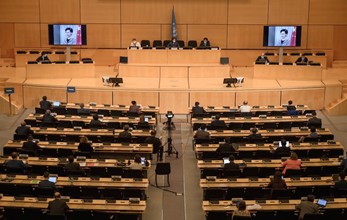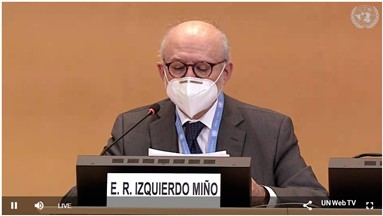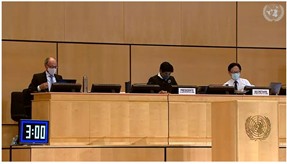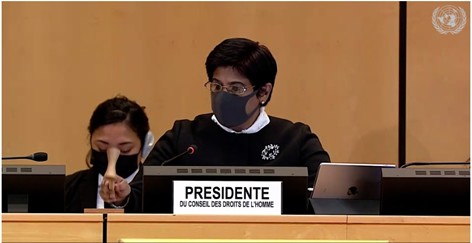Interrelation of human rights and human rights thematic issues: Presentation of Report of the Intergovernmental Working Group on Transnational Corporations (9 March, 10-13h)
ITEM 3 – Promotion and protection of all human rights, civil, political, economic, social and cultural rights, including the right to development
46th Session of the Human Rights Council (22 February to 24 March 2021)
By: Jennifer Tapia Boada/GICJ
Summary: At the 26th meeting of the 46th session of the Human Rights Council, the Chair of the Open-Ended Intergovernmental Working Group on TNCs and OBEs with respect to human rights presented its Report, which compiles the comments made by stakeholders and the conclusions reached at the 6th session of the WG, held in October 2020. The mandate of the WG is to elaborate an international legally binding instrument to regulate the activities of transnational corporations and other business enterprises. The 6th session, held in October 2020, oversaw the 2nd revised draft of the treaty as prepared with the help of informal consultations with stakeholders. The 7th session of the Working Group will take place in October 2021, a process that will contribute to the legal development of international human rights law.
Background
At is 26th session, held from 10 to 27 June of 2014, the Human Rights Council adopted resolution A/HRC/RES/26/9, with a recorded vote of 20 Members in favour, 14 Members against, and 13 Member abstaining, entitled Elaboration of an international legally binding instrument on transnational corporations and other business enterprises with respect to human rights.
Acknowledging that transnational corporations and other business enterprises have the capacity to foster economic well-being, development, technological improvement and wealth, as well as causing adverse impacts on human rights, the said resolution decides to establish an open-ended intergovernmental working group (OEIGWG) on transnational corporations and other business enterprises with respect to human rights whose mandate shall be to elaborate an international legally binding instrument to regulate, in international human rights law, the activities of transnational corporations and other business enterprises.
The first session of the OEIGWG was held in July 2015. To present, the OEIGWG has already held six sessions to prepare and negotiate the elements for the draft legally binding instrument. The progress reached thus far can be seen in the second revised draft legally binding instrument[1], which garners 24 articles. The second revised draft was circulated by Ecuador, who is the Member State holding the Chairmanship of the working group. The document was the basis for further negotiations during the sixth session of the OEIGWG, which took place from 26 to 30 October 2020, in Geneva.
Report of the open-ended intergovernmental working group (A/HRC/46/73).

At its 46th session, the Human Rights Council considered the report of the OEIGWG on transnational corporations and other business enterprises with respect to human rights, which was adopted at its sixth session held in Geneva from 26 to 30 October 2020.
The report summarizes the discussions of the sixth session.
Firstly, the Chair of the OEIGWO noted human rights abuses relating to business activities impact different social groups in different ways, but disproportionately. It was also noted that the binding instrument is intended to be mutually reinforcing of existing standards, such as the Guiding Principles on Business and Human Rights. Moreover, the Chair noted that important modifications were made in the second revised draft to fill gaps in international law, broaden the protection of victims, promote access to justice, clarify State obligations and business responsibilities, and facilitate mutual legal assistance and international cooperation.
During the sixth session, some delegations stressed that the Covid19 crisis has shed light on human rights abuses by pharmaceutical companies, with respect to worker protections, and inequities throughout supply chains. The positive role business could have in promoting development and attaining the Sustainable Development Goals was also discussed. Some delegations cautioned that the goals of the instrument need to balance human rights protection and economic development.
Most of the discussion focused on suggesting changes in the language contained in the text of the second revised draft of the treaty, some of these suggestions are summarized as follows:
Expand the Preamble to include a reference to children’s rights, conflict-affected areas, and the primacy of human rights over trade and investment treaties.
Article 1 (Definition). The appropriateness of using the word “victim” was questioned and it was suggested that the terminology be changed to “rights-holder”, or “affected individuals and communities”. Many delegations raised questions about the reference in that article to “environmental rights”, and “State-owned enterprises” with some calling for its removal.
Article 2 (Statement of Purpose). Stakeholders suggested that article 2 make specific reference to businesses undertaking activities of a transnational character.
Article 3 (Scope). Stakeholders welcomed the second revised draft’s application to all business enterprises. However, other stakeholders argued that the instrument should impose obligations directly on transnational corporations and that such broad scope exceeded the mandate established by the Human Rights Council in its resolution 26/9.
Article 4 (Rights of Victims). Some stakeholders considered it to be one of the most important articles. In contrast, other delegations considered that the article was inappropriate and that it placed an excessive burden on States. There were suggestions to delete article 4 in its entirety. It was also suggested that article 4 (2) (e) be moved to article 5 (protection of victims), and that the reference in article 4 (2) (e) to “retaliation” be replaced with “reprisal”.
Some delegations approved the new article 5 (Protection of victims), although there were calls to merge some of its provisions with those of article 4. Stakeholders proposed to strengthen the protection of victims by explicitly protecting trade unions.
Article 6 (Prevention). Some delegations stated the article fails to respect existing domestic laws of States. However, other stakeholders considered article 6 to be one of the most important parts of the instrument. Non-governmental organizations, in particular, requested that the provision be strengthened, for instance by expanding it to add more vulnerable groups to indigenous peoples.
Article 7(Access to Remedy). Some delegations raised concerns about:
7.5. State Parties shall ensure that the doctrine of forum non-conveniens is not used by their courts to dismiss legitimate judicial proceedings brought by victims.
7.6. State Parties may, consistent with the rule of law requirements, enact or amend laws to reverse the burden of proof in appropriate cases to fulfil the victims´ right to access to remedy.
In their view, the provisions were too encroached upon domestic law. However, many civil society organisations signalled their strong support for the provisions as they were deemed necessary for victims to obtain access to justice.
Stakeholders considered article 8 (Legal Liability) to be key to ensuring access to justice. However, concerns were raised by some delegations with regard to the references to the criminal liability of legal persons. There were calls for a clearer distinction between civil, criminal and administrative liability, and to include more references to civil liability. Many stakeholders welcomed article 8 (8) (Human rights due diligence shall not automatically absolve a legal or natural person conducting business activities from liability for causing or contributing to human rights abuses) and called for it to be strengthened. However, other stakeholders considered that article 8 (8) reduced incentives for preventive efforts.
Articles 9, 10 and 11 (Adjudicative Jurisdiction, Statute of limitations, Applicable laws). It was suggested that each article make a clearer distinction with regard to which provisions applied to civil cases and which applied to criminal cases. Some delegations and business organizations were concerned that those articles would allow for too much “forum shopping” by victims. However, other stakeholders supported 9 (3) that courts shall not decline jurisdiction on the basis of forum non-conveniens, and 9 (5) addressing forum necessitatis.
Stakeholders recognized the importance of article 12 (Mutual legal assistance and international judicial cooperation), although some delegations requested its removal for being considered to place excessive burdens on States.
Article 13 (International cooperation). Some stakeholders proposed to add a reference to common but differentiated responsibilities States, or by covering situations where human rights harms stemmed from business activities from one State in a different State.
Article 14 (Consistency with international law principles and instruments). Some delegations voiced concerns with regard to article 14 (5), questioning whether it was appropriate to specifically reference trade and investment agreements in the instrument. However, other delegations welcomed the provision. Non-governmental organizations recalled the connections between the business and human rights agenda and trade and investment agreements and argued that the inclusion of Article 14 (5) was crucial to the instrument.
Article 15 (Institutional arrangements), many civil society organisations called for a stronger institutional framework, requesting that an international tribunal be created, or that the “committee” (referred to in the Article) be given the competence to adjudicate individual cases.
Articles 16 to 24: Most of the discussion focused on article 16 (Implementation). Some stakeholders recommended strengthening article 16 (3), by adding references to occupied territories, child soldiers and the worst forms of child labour, including forced and hazardous child labour. Stakeholders suggested that, in article 16 (4), it be made more explicit that the list of those facing heightened risks of human rights abuse was not meant to be exhaustive. There were also calls to add references in that list to, among others, older persons, people of African descent, the urban poor, local communities, and lesbian, gay, bisexual, transgender and intersex persons. With respect to article 16 (5), one delegation welcomed the reference to international humanitarian law, whereas another questioned its relevance to the instrument.
The Chair-Rapporteur underscored the preparation of a third revised draft legally binding instrument on the basis of the discussions held during the sixth session of the OEIGWG, to be circulated no later than the end of July 2021, for consideration and further discussion. The Chair also noted that a programme of work for the seventh session will be prepared and made available before the seventh session of the working group (to take place in Geneva, in October 2021).
The OEIGWG took note of the comments and concrete textual suggestions received from stakeholders on substantive issues relating to the second revised draft instrument.
The report also notes that at the end of the sixth session of the OEIGWG on transnational corporations and other business enterprises with respect to human rights, on 30 October 2020, the draft report of the sixth session was adopted ad referendum. The working group also decided to entrust the Chair-Rapporteur with its finalization and submission to the Human Rights Council for consideration at its 46th session, in March 2021.
Presentation and Debate of the Report by the open-ended intergovernmental working group (OEIGWG) on Transnational Corporations (TNCs) and other business enterprises (OBEs) with respect to human rights

Geneva, 9 March 2021.- At the 26th meeting of the 46th session of the Human Rights Council, the Permanent Representative of Ecuador to the United Nations Mr Emilio Rafael Izquierdo, who is also the Chair-Rapporteur of the OEIGWG on Transnational Corporations and other business enterprises with respect to human rights, presented its Report A/HRC/46/73 (described above), which compiles the comments made by stakeholders and the conclusions reached at the sixth session of the OEIGWG held in October 2020. The Chair-Rapporteur noted that around 67 Member States, 2 Observer States and several civil society coalitions took part in the October session.
As stated before, the mandate of the OEIGWG is to elaborate an international legally binding instrument to regulate the activities of transnational corporations and other business enterprises. The sixth session of the OEIGWG oversaw the second revised draft of the treaty, as prepared with the help of informal consultations with stakeholders.
The Chair-Rapporteur stressed the work of the OEIGWG is challenging but crucial for empowering affected communities, and in particular human rights defenders, in the context of the difficult situation exacerbated by the present Covid19 pandemic. The second revised draft of the international legally binding instrument stresses the protection and prevention of human rights abuses by TNCs, guarantees access to remedy, and strengthens international cooperation.

The new third revised draft of the treaty will be circulated in July this year, before the 7th session of the OEIGWG, to take place in October 2021. Mr Emilio Rafael Izquierdo invited stakeholders to participate in the negotiation process to contribute to the legal development of international human rights law.
The Chair-Rapporteur highlighted that he was available to organize informal consultations with all interested actors prior to the seventh session, and would be inviting a group of experts from different legal systems in the next few months.
In the ensuing General Debate, the process towards the binding instrument was welcomed by many stakeholders, calling for further international solidarity and cooperation.

GICJ position and recommendations
Geneva International Centre for Justice expresses its strong support for all efforts conducive to the final adoption of a legally binding treaty on TNCs and human rights. However, GICJ believes that the adoption of the binding treaty is the first step of many necessary ones to prove its success, such as the ratification and implementation of the treaty at the domestic level, the harmonization of legal procedures, and the establishment of domestic enforcement and follow–up mechanisms.
GICJ welcomes the new developments of the second revised draft of the treaty for ensuring greater access to justice for victims as well as the provisions related to International Judicial Cooperation. GICJ calls on States to strengthen these provisions for guaranteeing victims protection.
GICJ believes that the scope of the treaty should provide a specific focus on business of transnational character, in light of the legal gaps originated by the extraterritorial complexity of these entities.
Moreover, underscoring the primacy of human rights over trade and investment treaties throughout the text is crucial to the instrument and GICJ strongly supports their specific reference in the second revised draft.
It is also crucial to strengthen implementation provisions (Art.16) by adding a reference to occupied territories as well as minority groups and stateless persons to the list of those facing heightened risks of human rights abuses.
GICJ encourages civil society organisations to continue to document cases of human rights abuses by TNCs and business’ operations. GICJ also encourages CSOs, the media, and academia to continue to be seized of the negotiation process towards the final adoption, with a view to reaching a worthwhile treaty that is truly focused on the interests of the most affected communities. However, until the treaty is adopted, GICJ believes that the United Nations Guiding Principles (UNGPs) continue to be the fundamental norm for business and human rights, and GICJ calls on all States to commit to its principles.
Lastly, GICJ reiterates that besides the future legally binding treaty, there are already human rights instruments that are binding upon States, which should act as crucial guidance for TNCs and other business enterprises, such as the International Covenant on Civil and Political Rights, the International Covenant on Economic, Social, and Cultural Rights, and the eight ILO core conventions.
[1]https://www.ohchr.org/Documents/HRBodies/HRCouncil/WGTransCorp/Session6/OEIGWG_Chair-Rapporteur_second_revised_draft_LBI_on_TNCs_and_OBEs_with_respect_to_Human_Rights.pdf




